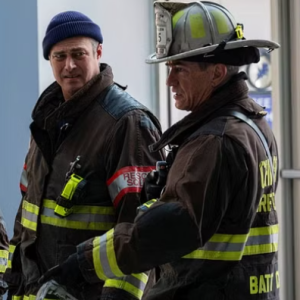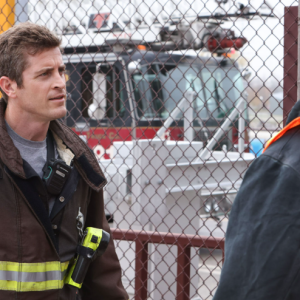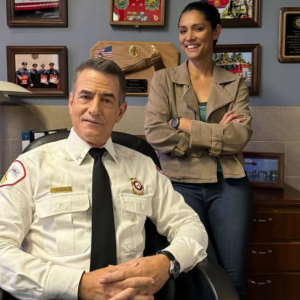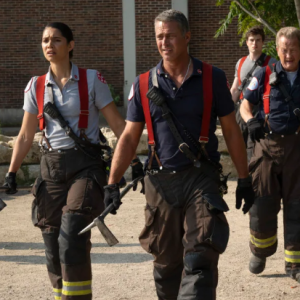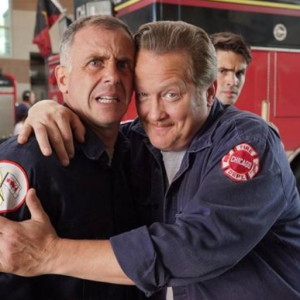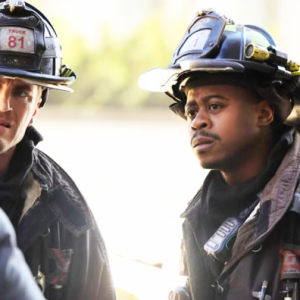For over a decade, Chicago Fire has stood as one of NBC’s most reliable anchors, a series built on the courage of Firehouse 51 and the unbreakable family bond among its crew. The show has thrived on a delicate balance of high-stakes emergencies and deeply emotional character arcs, drawing fans into both the flames of Chicago’s streets and the quiet vulnerabilities behind the station’s walls. Now, as it heads into Season 14, uncertainty looms larger than ever before. A recent update from showrunner Andrea Newman has shaken the fandom, hinting at a massive upheaval that goes beyond another fire or rescue—it threatens the very foundation of Firehouse 51. Newman’s words are calculated yet chilling: the future of the house is “still up in the air,” and with that, fans brace themselves for an unprecedented exodus, professional instability, and emotional fallout that could change the DNA of the series. This isn’t just another season premiere; this feels like the dawn of a reinvention, where even the most loyal viewers can no longer assume their favorite firefighters are safe.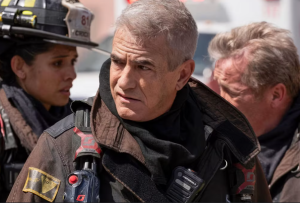
The departures alone read like a bombshell script. Daniel Kyri, who breathed life into Darren Ritter since Season 7, will no longer be the calm, steady heartbeat of Truck 81. Ritter’s arc from nervous rookie to competent, dependable firefighter wasn’t just another storyline—it was a reflection of the show’s soul, a reminder that growth and loyalty could thrive amidst chaos. Jake Lockett’s Sam Carver, meanwhile, was only beginning to step into the spotlight, his professional identity entwined with a budding romance with Violet Mikami. His abrupt exit feels not just premature but devastatingly cruel, ripping away a love story before it could fully bloom. And Michael Bradway’s Damon, introduced with promise and youthful energy, has been written out almost as quickly as he arrived, signaling a willingness by the writers to snuff out potential as swiftly as fire itself consumes oxygen. Chicago Fire has endured exits before—Casey’s bittersweet farewell, Shay’s gut-wrenching death, Dawson’s life-altering decision—but never has it faced such a concentrated wave of loss in one fell swoop. It isn’t a gradual reshaping; it is an earthquake, and the aftershocks will ripple through every corner of the firehouse.
Andrea Newman’s update only heightens the sense of dread and suspense. By declaring the stability of Firehouse 51 “still up in the air,” she plants seeds of uncertainty that go far beyond casting announcements. This is not the clean, narrative-driven departure of old, where a character moves away, dies tragically, or gets promoted. Instead, Newman teases ambiguity—a gray zone where characters may disappear not with finality, but with the cruel randomness of real life. The most likely narrative engine behind this is departmental budget cuts, a storyline that mirrors real-world struggles for first responders. In such a scenario, no one is safe: jobs hang by a thread, futures teeter on bureaucratic whims, and heroes are forced to reckon with the possibility of being discarded not because they failed, but because numbers on a spreadsheet demanded it. This approach is as unsettling as it is brilliant, because it injects a volatile realism into a procedural drama. The uncertainty itself becomes the villain, one that cannot be outsmarted with bravery or extinguished with water. And crucially, it leaves doors ajar. Ritter, Carver, or Damon may one day walk back into Firehouse 51, their fates unresolved enough to allow for a surprise return.
The impact of this instability cannot be overstated. Firehouse 51’s identity has always rested on the idea of family, of unshakable trust, of knowing that even when the flames rise high, the person beside you will not falter. That sense of security is now fractured. Veterans like Severide, Kidd, and Boden will be tasked with rebuilding morale while training new recruits to fill the gaping voids left behind. These rookies won’t just be new faces; they’ll be symbols of disruption, forced to prove themselves to a family still mourning its losses. Conflict is inevitable, not just in fire rescues but in the quiet moments of grief and doubt between calls. Violet will be left to grapple with heartbreak as Carver’s absence rips away both her partner in the field and the man she was beginning to love. The entire company will ache for Ritter’s quiet steadiness, his ability to de-escalate tension with his calm presence. And Damon’s vanishing act will leave fans uneasy, as if the firehouse itself has become a revolving door of uncertainty. Narratively, the show will pivot toward exploring how a close-knit family copes when its foundation cracks, how leaders rise or crumble when stability is stripped away, and how firefighting’s psychological toll intensifies under the shadow of instability.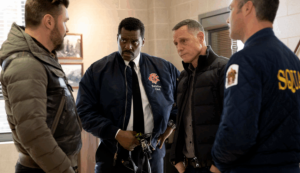
For a series entering its 14th season, such a seismic shake-up is both a risk and a revelation. Long-running shows often stagnate under the weight of predictability, but Chicago Fire has never shied away from loss as a narrative engine. Shay’s death reshaped the heart of the firehouse, Casey’s exit redefined its leadership, and Dawson’s departure reoriented its emotional compass. Now, the “up in the air” philosophy signals something even bolder: a willingness to lean into uncertainty as the drama itself. It is no longer about one character leaving but about the fragility of the firehouse’s very identity. This reinvention isn’t a death knell—it’s a rebirth. By making instability the central theme, the writers force both characters and fans to live in suspense, to cherish every bond knowing it could be broken at any moment. While Newman’s update may have set fandom nerves on fire, it also ignited anticipation: Season 14 will not be business as usual, but a relentless, unpredictable ride where every shift feels like it could be the last for someone we love. And that, perhaps, is the greatest testament to Chicago Fire’s longevity—not its ability to remain the same, but its courage to embrace the unknown and still burn brighter than ever.
